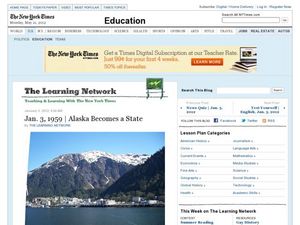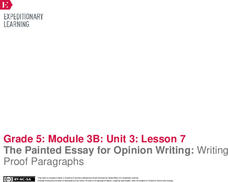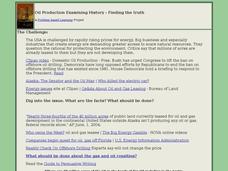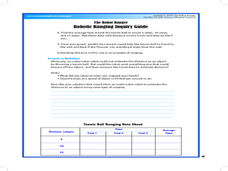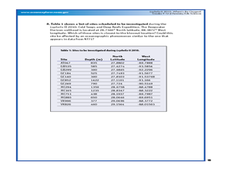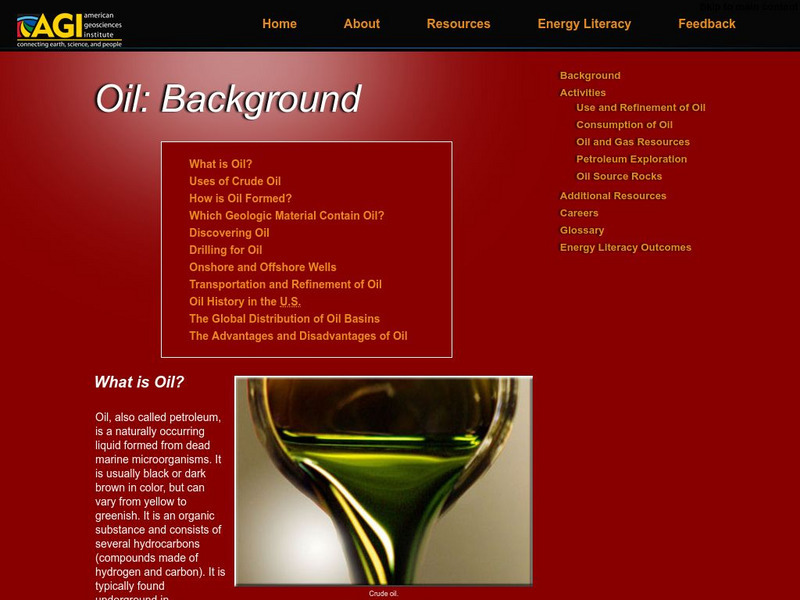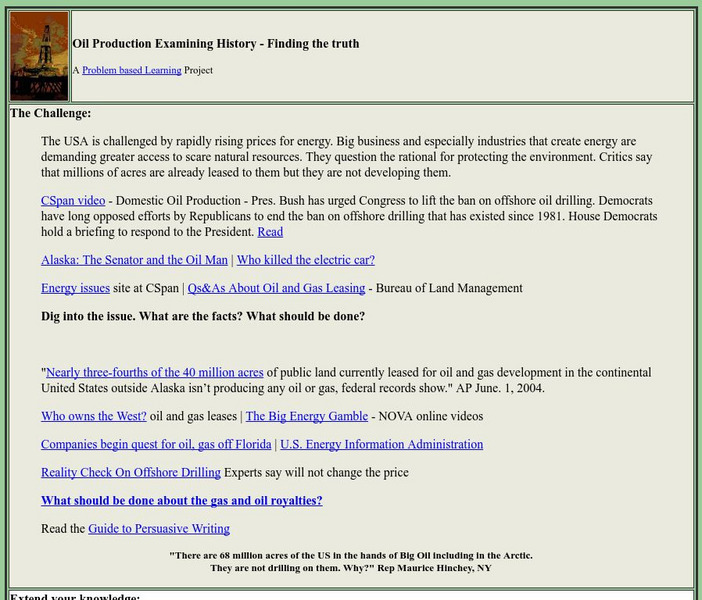Curated OER
Cartoons in the Classroom: Conserve or Drill
To drill or to conserve? This question is the foundation of the political cartoons up for critical analysis in this well-composed learning exercise. Learners will analyze two cartoons guided by background information and excellent...
Curated OER
Jan. 3, 1959 | Alaska Becomes a State
Make connections with past history and current events with this critical thinking exercise. Kids read background information relating to Alaska's statehood as well as information on oil drilling and Alaska's economy. They put it all...
EngageNY
The Painted Essay for Opinion Writing: Writing Proof Paragraphs
It's time to proof read! Pupils read and analyze proof paragraphs from a model essay. They then practice writing their own proof paragraphs to express an opinion about offshore oil drilling.
Curated OER
The Gulf Oil Disaster
High schoolers take a closer look at the Gulf oil spill of 2010. In this global issues lesson, students analyze political cartoons related to the crisis. High schoolers discuss their impressions of the crisis and U.S. energy policies.
Curated OER
British oil dispute with Argentina deepens
Ninth graders discuss the conflict about oil between Britain and Argentina. In this Political conflict instructional activity, 9th graders read an article and answer guided reading questions. Students write an email to their teacher...
Curated OER
Cartoons for the Classroom: Conserve More or Drill More?
In this current events worksheet, students analyze a political cartoon about oil drilling and respond to 3 talking point questions.
Curated OER
Oil Production Examining History - Finding the Truth
In this oil production worksheet, students click on the links to read about oil production and then answer short answer questions. Students also write a persuasive essay about what they think should be done.
Curated OER
Oil Market Basics
In this natural resources worksheet, students take a ten question quiz based on their knowledge of the oil market. This a multiple choice quiz.
NOAA
Biological Oceanographic Investigations – Signals from the Deep
The Deepwater Horizon oil spill directly impacted an area of the Gulf of Mexico the size of Oklahoma. A marine biology lesson looks at the impact of an oil spill on the deeper parts of the ocean. Scholars download actual data collected...
Curated OER
Exploring the Science of Oil
Learners analyze the basic techniques used to find and produce oil. They also create a small project that allows them experiment with solutions to maximize the amount of colorless liquid produced from colored solutions.
EngageNY
The Painted Essay for Opinion Writing: Developing a Conclusion and Adding Linking Words
Let's get colorful! Scholars use the Painted Essay technique to analyze and color code the conclusion of a model essay. Working in small groups, pupils then write a conclusion paragraph for their draft editorials about offshore drilling.
Curated OER
The Robot Ranger
Students participate in an experiment to understand how robotic systems can estimate distances. In this robotic ranger lesson, students measure the the time it takes for and object to move back and forth. Students will use a tennis...
E Reading Worksheets
Fact and Opinion - Worksheet: 5
After reading 25 sentences, individuals decide if they are facts or opinions. Then, they explain their answer in a supporting sentence.
Curated OER
Your Expedition of Discovery
Students study GPS and see how it is used to determine points on the Earths surface. In this expedition lesson students use GPS to find given coordinates.
Curated OER
Where's the Oxygen?
Young scholars study seawater and how temperature and salinity influence it. In this oxygen lesson students complete a lab activity on dissolved oxygen.
ESL Flow
Endangered Species
Students label the endangered species on the page. In this investigative instructional activity students answer the questions on the instructional activity about endangered species.
Curated OER
Why Do We Need Petroleum?
Students learn the many ways petroleum is used in our industrial society, and the advantages and disadvantages of its use. They explore what it would be like to live in a world without petroleum.
PBS
Pbs News Hour Extra: Drill, Baby, Drill?
In this lesson, for grades 7-12, learners will examine President Obama's proposed policy on offshore drilling, the various positions on offshore oil exploration and participate in a mock-policy committee to develop policies for offshore...
Encyclopedia of Earth
Encyclopedia of Earth: Ocean Oil: Offshore Petroleum
A collection of articles on offshore oil. Some of the topics covered include the Deepwater Horizon oil spill, oil exploration and oil reserves, oil drilling, and the history of oil and gas.
US Energy Information Administration
U.s. Eia Energy Kids: Nonrenewable Oil (Petroleum)
Provides good information about oil made from petroleum. Covers production, offshore drilling, fuel products made from crude oil, the refining process, and environmental issues. Includes helpful charts and maps.
Other
Maersk: Quest for Oil
Test knowledge and understanding of the oil industry worldwide through online gaming and educational resources. Identify key challenges to the industry, offshore drilling, and global opportunities for growth.
American Geosciences Institute
American Geosciences Institute: Oil: Background
A reference page on oil. Learn about what is, uses of crude oil, how it formed, how it is drilled for both onshore and offshore, the history, and the advantages and disadvantages of oil.
Choices Program, Brown University
Choices: Teaching With the News: The Gulf Oil Disaster
Multi-media lesson plan includes a video, PowerPoint, and handouts from which learners explore the issues raised by the 2010 Gulf of Mexico oil disaster and interpret political cartoons and the cartoonist's message.
Cynthia J. O'Hora
Mrs. O's House: Oil Production Examining History Finding the Truth
Students will dig into researching the history of oil production to possibly uncover some truths about why the United States doesn't do more drilling on its own land. When research is complete, students will write persuasive letters to...



